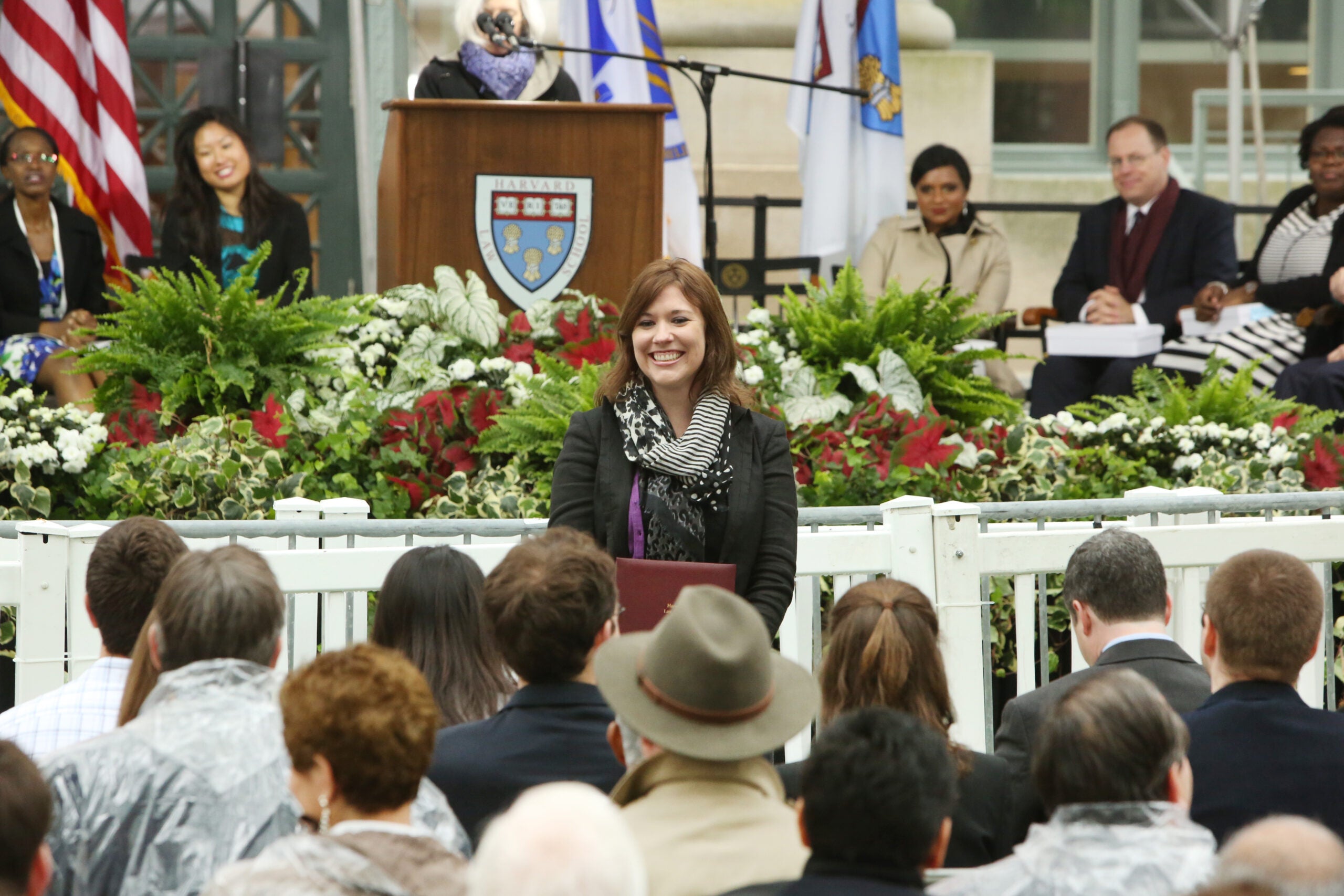A number of Harvard Law students received special awards this year during the 2014 Class Day ceremony on May 28. The honored students were recognized for their outstanding leadership, citizenship, compassion and dedication to their studies and the profession.
Andrew L. Kaufman Pro Bono Service Award
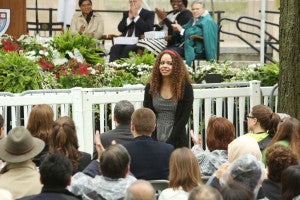
This year’s Andrew L. Kaufman Pro Bono Service Award was presented to Kimberly Paige Newberry, honored for completing 2,329 pro bono hours. Newberry is dedicated to learning how to be a criminal defense lawyer and to advocating for justice in the capital defense system. She started her work 1L year with Harvard Defenders and the Prison Legal Assistance Project and was the co-managing director of PLAP her 3L year. Since her 2L year, she has participated in clinics every semester, including the Housing Law Clinic and the Criminal Justice Institute.
The Andrew L. Kaufman Pro Bono Service Award is granted each year in honor of Professor Andrew Kaufman, who has been instrumental in creating and supporting the Pro Bono Service Program at HLS. The J.D. student in the graduating class who performs the highest number of pro bono service hours receives the award and a $500 honorarium.
HLS requires all students to perform 40 hours of pro bono services but most go far beyond. This year, nine students exceeded 2000 hours of service and 99 students volunteered more than 1000 hours.
The William J. Stuntz Memorial Award for Justice, Human Dignity and Compassion
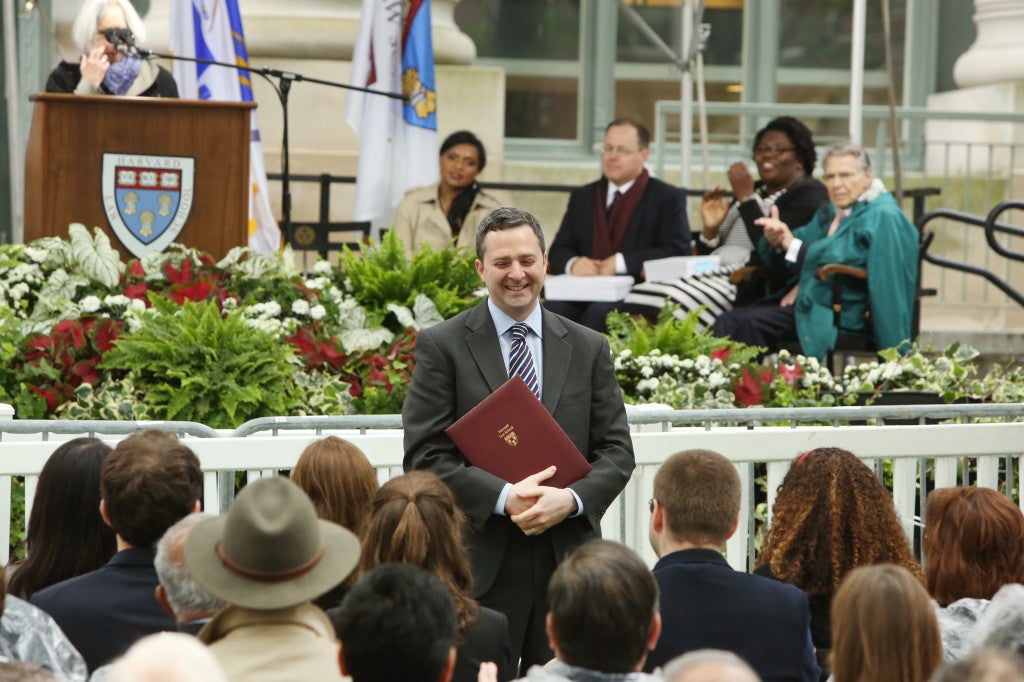
The Stuntz award was presented to Michael David Klinger. The award recognizes a graduating student who has demonstrated an exemplary commitment to the principles of justice, human dignity and compassion while at Harvard Law School.
Klinger has long been involved with the Innocence Project, a national, nonprofit litigation and public policy organization focused on exonerating the wrongfully convicted through DNA testing and reforming the criminal justice system. His work with the project informed his decision to seek graduate degrees in theology and law, with a dual focus on criminal justice reform and nonprofit administration.
At Harvard Divinity School, Klinger started a student organization called the HDS Innocence Project Engagement Group (IPEG), which is committed to raising awareness about the causes and consequences of wrongful convictions, and engaging in local and national reform efforts to prevent such injustices from happening in the future. Harvard Kennedy School students recently formed a similar group, in partnership with HDS’s group, to support the passage of a DNA access bill in Massachusetts.
At Harvard Law School, Klinger collaborated with The Harvard Prison Studies Project and the Criminal Justice Institute to organize events featuring exonerated individuals and their families. His clinical work includes working with the Criminal Justice Institute, as a public defender for indigent clients in Roxbury, and with the Capital Punishment Clinic, where he worked for the Texas Defender Service representing several indigent clients on death row. He also returned to the Innocence Project this past summer as the Cadwalader Public Interest Fellow, where he wrote two strategic plans aimed at enhancing exoneree advocacy power, with a focus on how the Innocence Movement could better understand and attend to the unique needs of exonerees engaged in policy reform work.
The award is given in honor of the late William Stuntz, a renowned scholar of criminal justice at Harvard Law School, an evangelical Christian and a teacher much beloved by students and colleagues. Klinger is the fourth person to receive this honor since it was established in 2011.
The Frank Righeimer, Jr. Prize for Student Citizenship
The Righeimer Prize was presented to Lisa Michelle Lana. Established in memory of Frank S. Righeimer Jr. ’32, the prize is awarded annually to a graduating student in recognition of exceptional citizenship within the HLS community demonstrated through involvement in student organizations, community service groups or through individual efforts.
Lana served as president of the Student Representative Board, the HLS student government, for two years. She has also been involved in clinical activities as co-chair of the Mississippi Delta Project, and student attorney for the Prison Legal Assistance Program, Child Advocacy Clinic, and Harvard Immigration Project.
The David Westfall Memorial Award
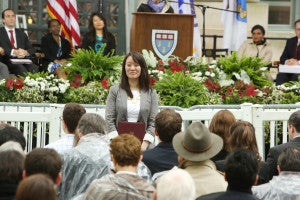
The Westfall Award was presented to Vivian Ban. Named in honor of the late Professor David Westfall, who taught at HLS for more than 50 years and served as an inaugural faculty leader for a first-year section, the award is presented annually to recognize student contributions to creating community within a first-year section and the wider class.
As a 1L, Ban led the Section 1 Events Committee for the Class of 2014, and she continued to organize events during her second and third years, keeping Section 1 strongly connected long after they officially disbanded. She has also been an active leader in many other areas of the Harvard Law School Community. She served as a membership chair of the Asian Pacific American Law Students Association, intersectional committee chair of the Women’s Law Association, member of the Harvard Negotiators, and most recently she served as the co-chair for the first International Women’s Day Portrait Installation at Harvard Law School.
The Dean’s Award for Community Leadership
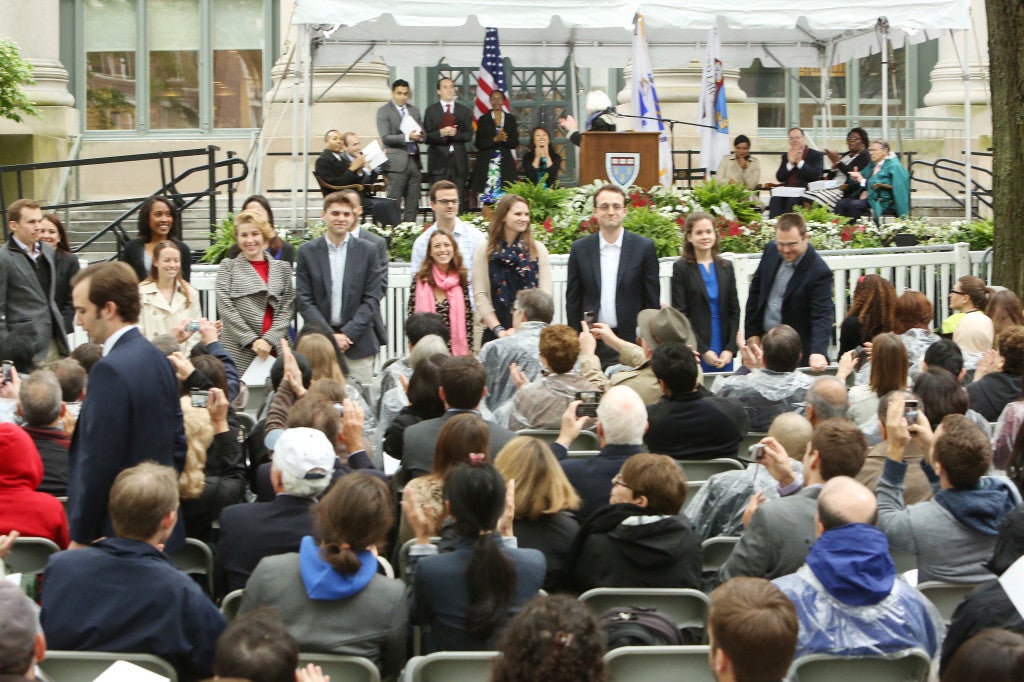
The Dean’s Award recognizes a number of graduating students who have contributed time and energy to making the HLS community a better place through involvement in student organizations, community service groups, and individual efforts.
- Christopher Michael Britten
- Michael Frederick Decker
- John Togbi-Tsikpo Dey
- Kristin Anne Fleschner
- Maryum Jamal Jordan
- Jo-Ann Tamila Karhson
- Kylie Chiseul Kim
- Mason A. Kortz
- Christine Margaret Marshall
- Alejandro Montt Rodriguez
- Emmy Chepkirui Rono
- Ari Solomon Ruben
- Jocelyn Rae Sedlet
- Jeanne Sarah Segil
- Arvind Vikram Sohoni
- Ryan C. Stewart
- Jean Welles Strout
- Sarah Ashley Wheaton
- Shadrack Tucker White
- Johannes Sten Widmalm-Delphonse
